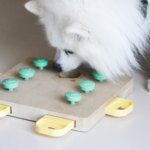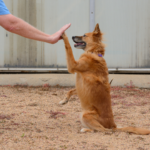Introduction
Dogs, our cherished companions, bring immeasurable joy and love into our lives. However, when our furry friends suffer from allergies, it tugs at our hearts. The persistent scratching, paw licking, and discomfort they experience are not only distressing for them but also challenging for pet owners. In this comprehensive guide, we explore holistic approaches to alleviate dog allergies, aiming to provide not just momentary relief but a sustainable and holistic well-being for our beloved pets.
Understanding the nuances of dog allergies is crucial. We embark on a journey to unravel the complexities, exploring the myriad factors that contribute to allergic reactions in our canine companions. From the foods they consume to the environments they inhabit, we delve deep into the root causes of these allergies, offering insights that go beyond surface-level symptoms.
As we navigate this multifaceted landscape, we equip pet owners with knowledge about common allergens. It’s not just the pollen in the air; it could be hidden ingredients in their diet or the materials used in grooming products. By identifying these triggers, we empower pet parents to make informed choices that can significantly impact their dog’s well-being.
Understanding Dog Allergies
Dogs, like humans, can suffer from allergies, and as devoted pet owners, understanding the intricacies of these allergic reactions is crucial for providing optimal care. Dog allergies can manifest in various ways, from incessant scratching and paw licking to gastrointestinal issues, making it essential to decode the symptoms and address them effectively.
Identifying the specific allergen triggering a dog’s reaction can be challenging. Common culprits include certain proteins in their diet, environmental factors like pollen and dust mites, or even the materials used in grooming products. Pinpointing these triggers is the first step in managing dog allergies.
Potential issues arise when pet owners mistake allergy symptoms for other health concerns, leading to delayed or ineffective treatments. Lack of awareness about the diverse ways allergies can manifest may result in overlooking the root cause. Educating pet owners about the broad spectrum of allergic reactions ensures they can recognize and address these issues promptly.
Practical solutions begin with informed decisions. Pet owners should familiarize themselves with common allergens, both in food and the environment. Transitioning to hypoallergenic diets, using allergen-free grooming products, and creating allergen-free zones at home are tangible steps toward relief. Moreover, consulting with a veterinarian to determine personalized allergy management strategies tailored to the individual dog’s needs is paramount.
Identifying Common Triggers
Dog allergies can be elusive, manifesting in various ways and leaving pet owners perplexed. Identifying the common triggers behind these allergies is crucial for effective management and ensuring our furry companions lead healthy, itch-free lives.
Potential issues arise when pet owners are unaware of the myriad triggers for dog allergies. From specific proteins in food to environmental elements like pollen and dust, these allergens can be challenging to pinpoint. Lack of knowledge about these triggers may lead to prolonged suffering for dogs and frustration for their owners.
Understanding common triggers is the key to resolving potential issues. Food allergies, often stemming from proteins like beef, chicken, or grains, are a prevalent cause. Environmental factors, including pollen, mold, and dust mites, can also contribute. Recognizing these triggers enables pet owners to create an environment that minimizes exposure, fostering relief for their dogs.
Practical solutions involve proactive measures. Pet owners should consider transitioning to hypoallergenic diets, avoiding known allergens in grooming products, and ensuring a clean living environment. Regular veterinary check-ups play a crucial role in identifying specific allergens affecting individual dogs, paving the way for tailored management strategies.
Holistic Nutrition for Allergy Relief
Holistic nutrition is emerging as a beacon of hope for pet owners navigating the realm of dog allergies. By focusing on comprehensive well-being through balanced diets and mindful nutrition, we can address potential challenges associated with canine allergies.
One potential issue is the lack of awareness surrounding the impact of diet on allergic reactions in dogs. Many pet owners may inadvertently feed their dogs ingredients that trigger allergic responses. A comprehensive understanding of holistic nutrition becomes paramount in overcoming this challenge.
Holistic nutrition emphasizes a well-rounded, nutrient-rich diet that supports the immune system and reduces inflammation. A practical solution involves incorporating hypoallergenic, high-quality protein sources like salmon or lamb and avoiding common allergens such as grains. Essential fatty acids, vitamins, and antioxidants play a crucial role in promoting skin and coat health, mitigating allergic symptoms.
To further address potential issues, pet owners can seek guidance from veterinarians or animal nutritionists, tailoring diets to individual dogs’ needs. Additionally, gradually transitioning to new diets prevents digestive upsets and allows for proper monitoring of any allergic reactions.
Environmental Modifications
Environmental modifications play a pivotal role in preventing and managing dog allergies. As responsible pet owners, understanding the significance of our dogs’ surroundings is crucial in addressing potential challenges associated with allergies.
One common issue is the lack of awareness regarding environmental factors that can trigger or exacerbate allergic reactions in dogs. Identifying these factors becomes the first step in creating a healthier living space for our furry friends.
Practical solutions involve minimizing exposure to common allergens such as pollen, dust mites, and mold. Regular cleaning routines, including vacuuming and air purifiers, can significantly reduce airborne allergens. Choosing hypoallergenic bedding materials and washing them frequently helps create a safe haven for dogs with sensitivities.
Addressing potential challenges also involves recognizing the impact of outdoor environments. Pollen and outdoor allergens can cling to a dog’s fur, causing discomfort. A solution includes regular grooming and wiping down paws after outdoor activities. Additionally, creating designated outdoor areas free from potential allergens aids in preventing exposure.
Pet owners can further seek guidance from veterinarians to identify specific environmental triggers for their dogs. Implementing practical solutions, such as using pet-safe cleaning products and maintaining a well-ventilated living space, contributes to an allergy-friendly environment.
Natural Remedies and Herbs
Understanding and addressing dog allergies often involve exploring natural remedies and herbs to promote overall well-being. While these alternatives can offer relief, it’s essential to navigate potential challenges for a comprehensive approach to canine health.
One challenge in utilizing natural remedies lies in the vast array of options available. Pet owners might encounter difficulty in identifying the most suitable herbs or remedies for their dog’s specific allergies. Consulting with a veterinarian is crucial to overcome this challenge, ensuring that chosen remedies align with the dog’s health needs.
Practical solutions include incorporating herbs known for their anti-inflammatory and immune-boosting properties. Common herbs like chamomile, nettle, and licorice root can provide relief from allergic symptoms. However, dosage and administration need careful consideration, emphasizing the importance of professional guidance.
Another challenge involves the variability in individual dog responses to natural remedies. While some dogs may show positive responses, others might not experience the same benefits. This highlights the necessity of observing a dog’s reactions and adjusting remedies accordingly.
To overcome these challenges, pet owners can maintain a comprehensive health record for their dogs, documenting any changes observed during the use of natural remedies. This aids veterinarians in tailoring recommendations based on individual responses.
Conclusion
In this extensive exploration of holistic approaches to alleviate dog allergies, we’ve navigated the intricate landscape of canine well-being. From understanding the unique challenges each dog faces to identifying common triggers, we’ve armed pet owners with knowledge that goes beyond the superficial. As we conclude, we emphasize the transformative power of holistic nutrition, environmental modifications, and natural remedies. The journey toward alleviating dog allergies is not just about soothing the itch; it’s about fostering a lifetime of health and happiness for our cherished companions.









